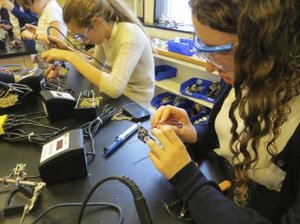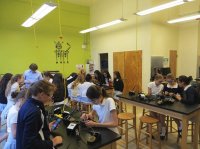Dive into the Maker Movement
Your content has been saved!
Go to My Saved Content.Maker Spaces, Fabrication Labs . . . it's been going on for some time now, but it's all the buzz in education these days. And with good reason.
I've been thinking about all this more and more since walking in on a session called "Digital Fabrication in K-12" at Educon this past January. One of the presenters that day, a fellow named Jaymes Dec, said, "I wish every classroom was a Maker Space."
Dec's comment resonated with me that day. I've felt the same way for years. I've seen a raft of evidence that "Maker" type spaces can provide a platform for otherwise compartmentalized academic subjects to collaborate.
That day at Educon, I decided to take a trip, talk with Dec and the see the Fab Lab he helped create at the Marymount School in New York City. I'm glad I did.
Makers at the Marymount School
Marymount is a private school in Manhattan, and that connotation of wealth can come with a perspective that a public school couldn't create a Maker program like the one Jaymes Dec has built up. Dec argues to the contrary. And he's right.
Keep Learning . . . With Students
Dec readily admits that he's learning, too.
As part of that learning curve, Dec has tried some over ambitious projects.
But who can you learn from? Where do you start?
Mentors and Resources are Everywhere
When I asked Dec who his mentors were, who he seeks help from when he's learning to teach, he said, "I've learned as much from Gary Stager as anyone else. Gary's been at this for a long time.” Dec said he attended Stager's Maker conference called Constructing Modern Knowledge (CMK), held in Manchester, New Hampshire every summer since 2008. Dec also mentioned a new book by Stager and Sylvia Martinez called Invent to Learn (with a great resource page on the site), describing it as "a super practical way to get started in the Maker Movement." I also attended CMK a couple of years ago and found it to be, as Stager called it, a "resource-palooza."
Some other ideas include:
- Attending a Maker Faire
- Reading up on MakeZine.com
- Visiting your local hackerspace
- Checking out the blog by Tracy Rudzitis of The Computer School
- Seeking some inspiration from Super Awesome Sylvia
For a list of Dec's Maker resources, visit his blog and also the Google Group for K-12 Makers. Stager's many resources are on the web as well.

Project Evolution . . . Abroad
Over his few years at Marymount, it's evident that Jaymes Dec has certainly gained some experience. I got to sit in on one of his seventh grade classes, and it was impressive to say the least. Here's the context for what I observed:
- They are teaching the children to fish, but there's no refrigeration to store the fish before it goes to market.
- The school has no reliable Internet service.
- There is a community center with no lights, so it is not useful at night.
Now, if you have no experience in the Maker Movement or digital fabrication, that can all sound pretty intimidating. The project shows the potential of what’s possible in learning spaces like this -- the merging of math, engineering, critical and design thinking, fabrication, job aids and the creation of documentation, design aesthetics . . . just to name a few.
Again, as Dec said, "You have to start somewhere. There are so many people out there to help when you have problems or need advice. Start small and keep building."
Building Bridges Between Subjects
Through my conversations with Dec, one thing became increasingly clear: Maker Spaces like the one at Marymount create bridges between traditionally compartmentalized subjects. He explained how some of the science classes were now using the Fab Lab, as were many art classes. Dec himself will be teaching fewer classes next year and working to integrate the Lab into other curricular areas. It's a movement I've seen in many places where multidisciplinary projects are beginning to tear down barriers between traditionally compartmentalized subjects.
The motion in the Lab also raises many questions about school scheduling. Dec meets with some classes only once per week. "Time can disappear when kids are making things," he said. He described how he'd love to have more time built into the schedule and meet with kids more regularly. These are some great challenges for Marymount and many other schools to address as these successful new programs grow.
Room to Learn
Dec explained that the school has purchased a new site across the street in Manhattan and new building plans are underway. Seeing the potential that the Fab Lab has brought to education, Dec had a gleam in his eye as he explained, "One whole floor of the new building could become a large Fabrication Lab. I wish there were a quicker timeline. I'd love to move into the new building this fall."
But this teacher is as humble as he is eager and inventive.
What could a Maker Space at your school conjure up? Exploring new ground, especially with students, is the key.
What's Next
I’d love to hear your comments and questions on the article. Just leave a comment below. Also, any recommendations on schools to visit are greatly appreciated.
Up next, I’ll get back to telling you about the trip I took to High Tech High in San Diego, California.
